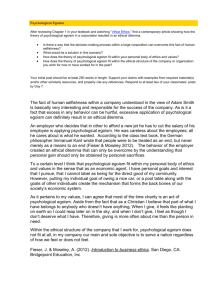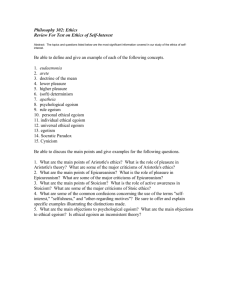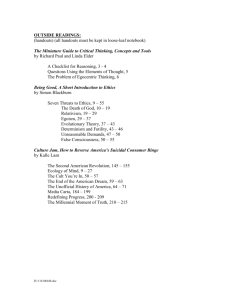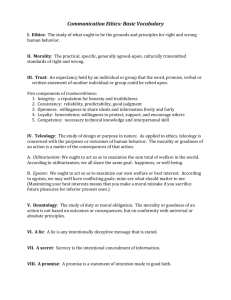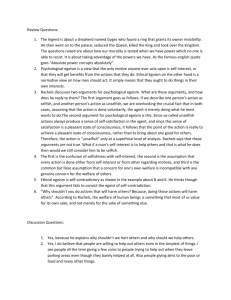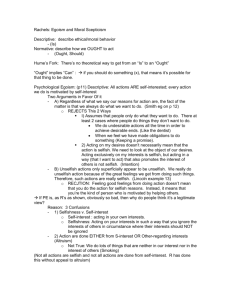Psychological Egoism, Hedonism and Ethical Egoism
advertisement
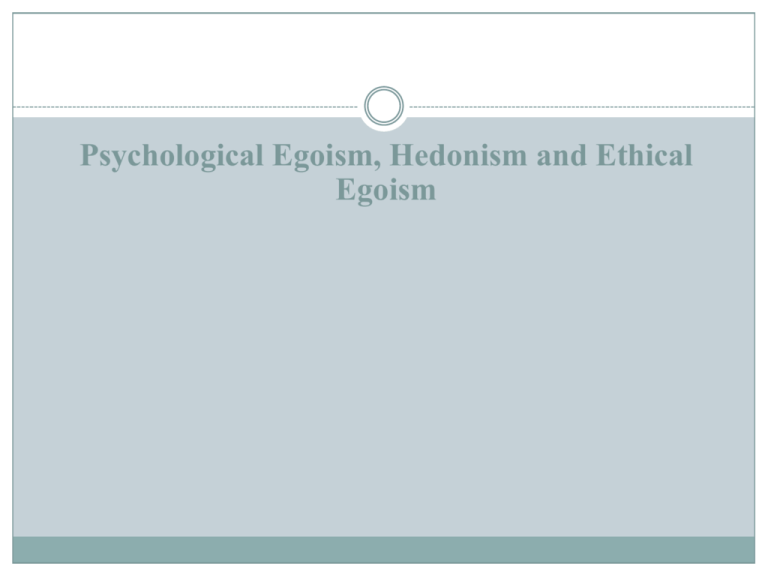
Psychological Egoism, Hedonism and Ethical Egoism “It’s all about me….” 2 Psychological Egoism, Hedonism and Ethical Egoism Psychological Egoism is the general term used to describe the basic observation that human’s mostly (or always) act selfishly. Psychological egoism claims that people predictably act in their own self-interest, seeking always to maximize results favorable to themselves. It asserts that this is human nature, and that ethics should not fight human nature but build a theory of ethics that is consistent with human nature. To do otherwise will not work in reality. But it is not that simple…. Psychological Egoism (Continued) 3 The “theory” is based on observation that psychological selfishness is so common, that a theory of ethical behavior, to be meaningful, should be based on this psychological realty. Claims persons can only act from their selfish psychology But is not so simple…… Psychological Hedonism 4 Very Similar to Psychological Egoism but emphasizes people want to do what they can to maximize their Pleasure and to minimize their Pain Pain-Pleasure Principle Psychologic Egoism 5 Complexity What is a selfish act (petty selfishness)? Are not all acts, in some basic way, psychologically selfish? Can selfish acts or a selfish society be a positive force? Can selfishness be the basis of a moral system? Psychological EGOISM (Continued) 6 Does Psychological Egoism meet our intuitional sense that there must be some standards of what is right or wrong, not just our saying OK to being selfish? Does Psychological Egoism truly reflect human reality or are we just generalizing or being too clever in always finding some selfish motivations like “it makes me feel good”? Motivations are too complex to simplify into “selfish” and not “selfish”. Is it a false logic to point out minor selfish thinking as proof of selfishness and as THE motivation when it may only be a small part of the motivation, may not be cause of the conduct or even relevant to the reason for the action/behavior was done. In other words, does Psychological Egoism over-emphasize and over-simplify our psychological process? 7 ETHICAL EGOISM Ethical egoism is the doctrine that all persons should (ought) to act from their own self-interest. It says selfish behavior is good & should be our guide Personal ethical egoism is the belief that only I should act from the motive of self-interest, nothing is stated about what motives others should act from. Individual ethical egoism is the doctrine that all persons should serve my self-interest Universal ethical egoism is the doctrine that all persons should pursue their own interests exclusively. ETHICAL Egoism 8 An ethical egoist says “The correct ethical action is that which is based on one’s self-interest, selfish desires and desire to maximize selfbenefit” Ayn Rand was the best known advocate of virtuous selfishness. She rejected altruism as a basis for moral conduct. She has had great influence on politics and economics Ethical Egoism (Continued) 9 According to Ayn Rand… the proper moral purpose of one's life is the pursuit of one's own happiness or rational self-interest; that the only social system consistent with this morality is full respect for individual rights, as seen in pure laissez faire ( no government interference) capitalism Examples of Ethical Egoism 10 The basic capitalist system uses ―greed‖ and self-interest in profit to maximize and energize economic activity and creativity Private ownership of personal property (not state owned) is a stimulus to productive activity (e.g. writing, music, architects) Reduced role of state. People will rely more on their own and not on state ―hand-outs‖ or protection Success measured by wealth and ―success‖ Psychologic Egoism expanded link to determinism 11 In addition to psychological factors that are so important, science suggests we are learning of more and more factors that may cause or contribute to our so-called ―selfish‖ behavior. maybe we should add Genetics & Biology: Genetic-Biological Egoism Social Factors: Sociological or Behavioral Egoism Hormonal & Chemical Egoism Neurological Egoism Fatalis Human Nature and Ethics Human Nature and Ethics Human nature is a kind of a blueprint Blueprint –way to escape responsibility ―We can’t help it, it’s our nature‖ Human nature pushes you into one direction or another Human nature is an inborn structure that defines the human being. Inborn structure defines how people will react o Ethics is how you ought to respond to the world around you Examining the idea of Human Nature Nature-what is it? Nature refers to the forests, parks, and the untouched landscape of the planet. You may say, ―Let’s go camp out in nature‖ thinking that you want to experience the world is in its normal, untouched state — the way in which your world is from/at the start. Nature refers to the kinds of powers, capacities, dispositions, or limitations that something has due to its normal untouched starting place or condition. You’re thinking of what is natural to the entity in question. Basic and original nature of a things tends to play a role in determining what is possible and impossible for that thing. How do you connect/relate this to human nature? Human nature and ethics Being able to do what ethics suggests that you ought to do is essential. Two types of things: Humans can do Humans cannot do General claim of ethics is: ―You ought to do/be/follow X‖ You ought … something The claim suggests that it’s up to you — that it’s possible and that you’re free to choose either way. Ethics claims that if you ought to do something, it must be the case that you can do it. Two important claims ethics make: The ―ought implies can‖ principle actually comes from Kant Ought to implies can. If you ought to do something, this means or implies that it’s already understood that you can do it. Can’t rejects ought. If you can’t do it, suggesting that you ought to do it is silly. “because ethics deals with things that we ought to do, ethics also should strive to clarify how and why it is that we can actually make choices” Humans must at the very least be free to act on what’s needed in order to fulfill their obligations (what they ought to do). Otherwise, those obligations just seem like cruel demands that they’re powerless to fulfill. Human nature and ethics …to do/be/follow X‖ ought to ―be‖ ethical (virtue ethics) or to ―do‖ ethical things (consequentialism), or to―follow‖ ethical principles or maxims (deontology) pursuing the ethical path means overcoming selfishness and embodying recognition of the value of others. Path: You could be naturally disposed toward what’s ethical — you could be naturally selfless. Perhaps love and sympathy are components of human nature, and they make your embracing of the ethical life easier to do. You could be naturally disposed away from what’s ethical, making you selfish. There’s a whole lot of greed out there in the world, and a lot of strife. It could be that you have no such disposition at all — human nature could be simply neutral to the ethical path. Freedom and Ethics Ethics requires nature that permits a free will Hard Determinism Hard determinists think that your basic nature as the kind of creature you are bars you from having free will. You may think that you’re free, and you may think that you make choices, but according to hard determinists, you really don’t. For a determinist, the future is always fixed Types of determinism: Genetic determinism Psychological determinism Theological determinism Causal determinism Examples: Rewind the universe Leave the class Hard Determinism: No choice-no freedom-no ethics If your actions are determined, then you have no free choices. If you have no choices, you have no freedom. If you have no freedom, ethics can’t apply to humans like you. Freedom and Ethics Compatibilism: compatiblists argue that human nature makes deliberation possible, and when your actions follow from deliberation — even if the process is determined — you’re fully free as a consequence. Compatibilist freedom requires the use of what your human nature makes possible: deliberation. This means that only creatures with a certain psychological nature can be free. Libertarianism Holds that if your behavior can always be predicted in principle (by some super being, perhaps), then you’re part of a determined universe because your behavior follows from the physical facts about you, the past, and the physical laws that govern the universe. So if your behavior could be predicted in advance, you aren’t free. And as a result, ethics doesn’t apply to you Human Nature: Good, Bad or Neutral? Human nature is disposed to the good Many philosophers think human nature is innately good, meaning that humans have a built-in disposition toward what’s seen as good by ethics. Mencius (BCE 372-289)- a Confucian philosopher Jean-Jacques Rousseau: Humans were good before they entered into the society Human Nature is disposed to the bad suffering in the world, and much of it is the result of overcompetition, strife, insensitivity, and selfishness. -human nature left on its own is bad Xunzi Human nature begins as evil or bad, which means that humans have a built-in tendency toward what benefits them individually. If left unchecked, this desire will inevitably lead to strife and conflict with others. Humans can, through conscious effort and not by nature, become good. Thomas Hobbes ―War of all against all‖ Human Nature: Good, Bad or Neutral? Human Nature is neither good or bad Many people are either optimists or pessimists, arguing that the existence of love and caring means human nature is good or that the existence of suffering and strife points to human nature being bad. Human nature is split between good and bad, and neither side actually predominates. Yang Xiong you feel the impulses coming from both directions, and one predominates the other only when you develop bad or good habits. Human nature has no tendencies in either direction because with respect to ethics, human nature is empty. Existentialists Existentialists famously deny that there’s a fixed moral direction to be pulled toward or away from in the first place! In the end, your nature, if you have one at all, is actually empty, consisting of merely potential, and having no moral trajectory or content or tendencies whatsoever.
